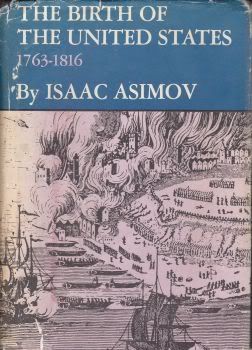© 1973 Isaac Asimov
274 pages, including a table of dates.

While trolling Amazon in search of elusive copies of Isaac Asimov's Roman history books, I chanced to find evidence of a four-book history series on the United States, beginning with European colonization and ending at the Great War. They're decades out of print, alas, and I won't be able to read all of them. The Birth of the United States picks up at the end of the French-Indian war (known in Europe as the Seven Years' War) and the beginnings of mutual Anglo-American resentment. Asimov then takes us through the Revolution, the Constitutional Convention, and up to the end of the War of 1812.
Asimov didn't achieve success as a writer by being poor at it: Birth is perfectly lucid. I don't think I've followed any account of the Revolutionary War as easily as this one. The political wrangling that followed the war, as the states with varying interests who proposed national constitutions that protected them from the others, could easily be dull -- but it isn't. Impressively, the normally opinionated Asimov is fair to the various clashing interests he covers. The British are not presented as tyrants, for instance, nor does he take sides when recounting the numerous issues between the states. He simply explains why everyone thought as they did, and detailed the ways in which varying decisions helped and hurt either side. In retrospect I am not surprised at his approach. There are rarely villains in his fiction works: he preferred instead to bounce characters with justified but opposing interests off one another. (He does opine against incompetent generals, though, and disapproves strongly of characters like Banastre Tarleton.) He's obviously fond of the subject matter, being a naturalized citizen of the US and an ardent humanist who believed in the United States' Enlightenment-era ideals. Asimov frequently takes the reader aside to mention trivial tidbits, like that after the Battle of Lexington, settlers in Kentucky renamed their settlement to commemorate the dawn of America's war for independence.
Reading The Birth of the United States was an experience both helpful and enjoyable. It filled in my own gaps of the period, and I'd recommend it to any reader needing or wanting an introduction to the early United States.
No comments:
Post a Comment
Thank you for visiting! Because of some very clever spambots, I've had to start moderating comments more strictly, but they're approved throughout the day.